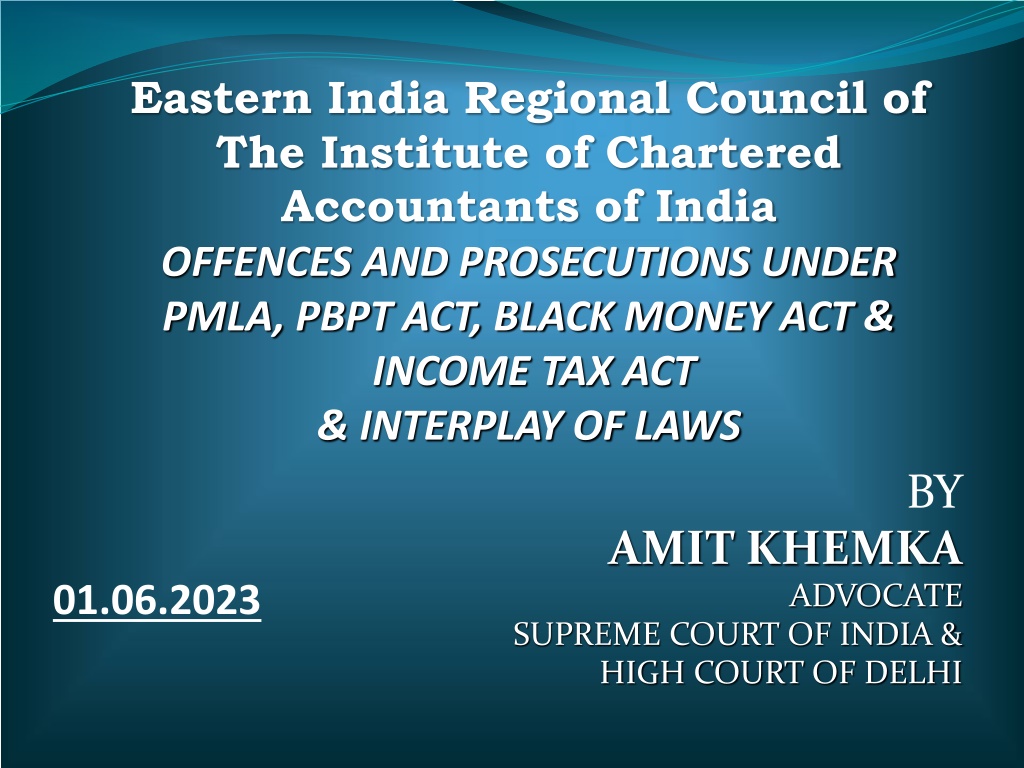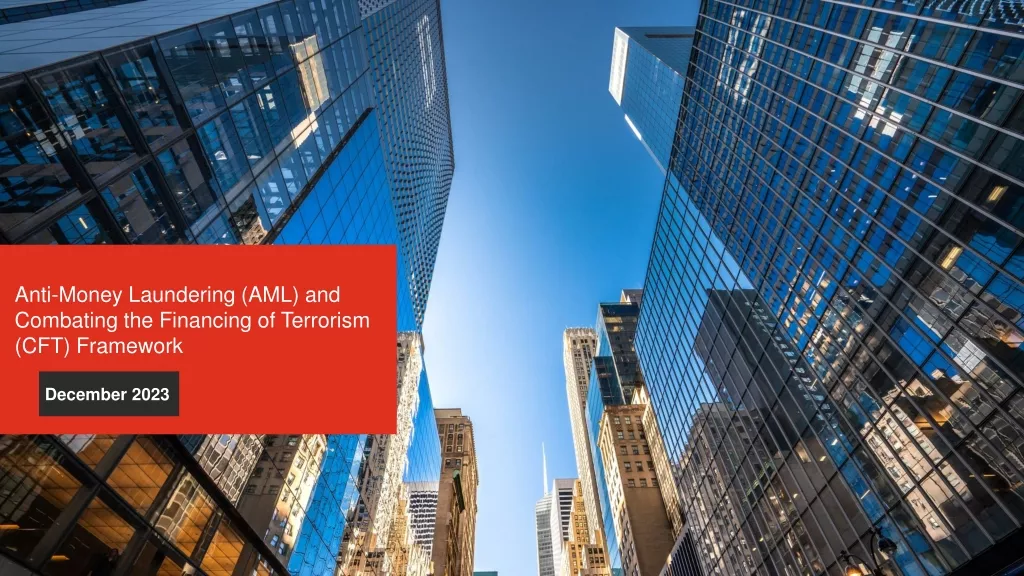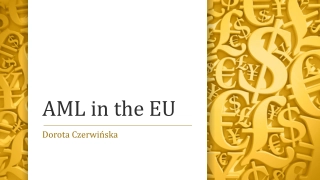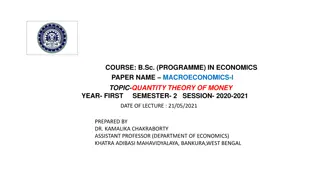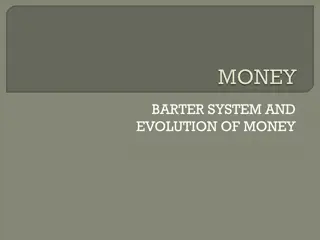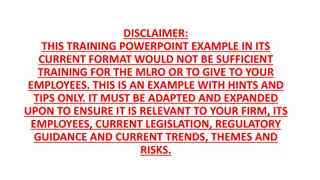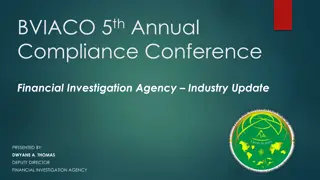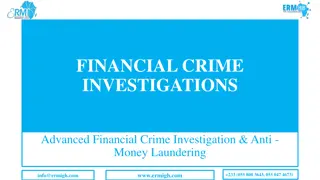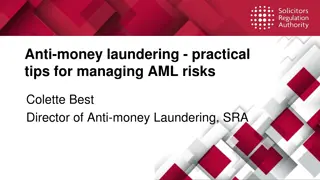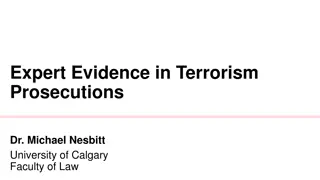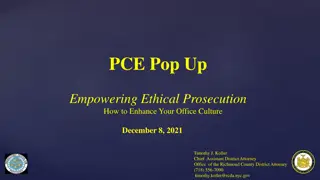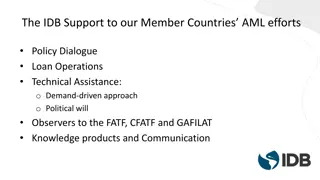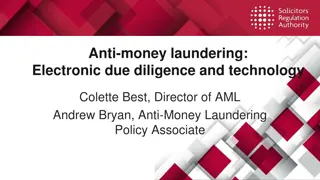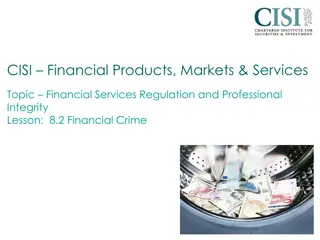Overview of Money Laundering and Prosecutions under Indian Laws
Learn about the offence of money laundering under Indian laws, including definitions, explanations, and the interplay of various acts such as PMLA, PBPT Act, Black Money Act, and Income Tax Act. Get insights into the definition of proceeds of crime and the associated legal implications.
Download Presentation

Please find below an Image/Link to download the presentation.
The content on the website is provided AS IS for your information and personal use only. It may not be sold, licensed, or shared on other websites without obtaining consent from the author. Download presentation by click this link. If you encounter any issues during the download, it is possible that the publisher has removed the file from their server.
E N D
Presentation Transcript
Eastern India Regional Council of The Institute of Chartered Accountants of India OFFENCES AND PROSECUTIONS UNDER PMLA, PBPT ACT, BLACK MONEY ACT & INCOME TAX ACT & INTERPLAY OF LAWS BY AMIT KHEMKA 01.06.2023 ADVOCATE SUPREME COURT OF INDIA & HIGH COURT OF DELHI
What is Money Laundering? 3. Offence of money-Laundering.- Whosoever directly or indirectly attempts to indulge or knowingly assists or knowingly is a party or is actually involved in any process or activity connected with proceeds of crime including its concealment, possession, acquisition or use and projecting or claiming it as untainted property shall be guilty of offence of money- laundering.
Explanation:- For removal of doubts, it is clarified that,- a person shall be guilty of offence of money-laundering if such person is found to have directly or indirectly attempted to indulge or knowingly assisted or knowingly is a party or is actually involved in one or more of the following processes or activities connected with proceeds of crime, namely:- Concealment; or Possession; or Acquisition; or Use; or Projecting as tainted property; or Claiming as untainted property, i. a. b. c. d. e. f.
in any manner whatsoever; ii. The process or activity connected with proceeds of crime is a continuing activity and continues till such time a person is directly or indirectly enjoying the proceeds of crime by its concealment or possession or acquisition or use or projecting it as untainted property or claiming it as untainted property in any manner whatsoever
What is Proceeds of Crime? Section 2(1)(u): "proceeds of crime" means any property derived or obtained, directly or indirectly, by any person as a result of criminal activity relating to a scheduled offence or the value of any such property [or where such property is taken or held outside the country, then the property equivalent in value held within the country] [or abroad]; [Explanation - For the removal of doubts, it is hereby clarified that proceeds of crime including property not only derived or obtained from the scheduled offence but also any property which may directly or indirectly be derived or obtained as a result of any criminal activity relatable to the scheduled offence;]
Whether unaccounted money is Proceeds of Crime? Similarly, possession of unaccounted property acquired by legal means may be actionable for tax violation and yet, will not be regarded as proceeds of crime unless the concerned tax legislation prescribes such violation as an offence and such offence is included in the Schedule of the 2002 Act. For being regarded as proceeds of crime, the property associated with the scheduled offence must have been derived or obtained by a person as a result of criminal activity relating to the concerned scheduled offence. (Vijay Madanalal Chaudhary)
Property derived or obtained, directly or indirectly 32. Be it noted that the definition clause includes any property derived or obtained indirectly as well. This would include property derived or obtained from the sale proceeds or in a given case in lieu of or in exchange of the property which had been directly derived or obtained as a result of criminal activity relating to a scheduled offence.
In the earlier part of this judgment, we have already noted that every crime property need not be termed as proceeds of crime but the converse may be true. Additionally, some other property is purchased or derived from the proceeds of crime even such subsequently acquired property must be regarded as tainted property and actionable under the Act. (Vijay Madanalal Chaudhary) 33. Tersely put, it is only such property which is derived or obtained, directly or indirectly, as a result of criminal activity relating to a scheduled offence can be regarded as proceeds of crime.
No Action on Assumption The authorities under the 2002 Act cannot resort to action against any person for money-laundering on an assumption that the property recovered by them must be proceeds of crime and that a scheduled offence has been committed, unless the same is registered with the jurisdictional police or pending inquiry by way of complaint before the competent forum. (Vijay Madanalal Chaudhary)
No action against a person finally absolved In the event the person named in the criminal activity relating to a scheduled offence is finally absolved by a Court of competent jurisdiction owing to an order of discharge, acquittal or because of quashing of the criminal case (scheduled offence) against him/her, there can be no action for money-laundering against such a person or person claiming through him in relation to the property linked to the stated scheduled offence.
Projection as untainted not necessary every activity independently laundering Money 41. Independent of the above, we have no hesitation in construing the expression and in Section 3 as or , to give full play to the said provision so as to include every process or activity indulged into by anyone, including projecting or claiming the property as untainted property to constitute an offence of money-laundering on its own.
Discovery of an Offence during investigation It is possible that in a given case after the discovery of huge volume of undisclosed property, the authorised officer may be advised to send information to the jurisdictional police (under Section 66(2) of the 2002 Act) for registration of a scheduled offence . If the offence so reported is a scheduled offence, only in that eventuality, the property recovered by the authorised officer would partake the colour of proceeds of crime under Section 2(1)(u) of the 2002 Act, enabling him to take further action under the Act in that regard.
Time Tested Principle of Criminal Law It is well settled that the prosecution, must stand or fall on its own legs and it cannot derive any strength from the weakness of the defence. This is trite law and no decision has taken a contrary view Sharad Birdhichand Sarda Vs. State of Maharashtra Supreme Court (DOD: 17.07.1984)
Section 24 (PMLA) - Burden of Proof In any proceedings relating to proceeds of crime under this Act,- (a) in the case of a person charged with the offence of money-laundering under section 3, the Authority or Court shall, unless the contrary is proved, presume that such proceeds of crime are involved in money- laundering; and (b) in the case of any other person the Authority or Court, may presume that such proceeds of crime are involved in money-laundering.
Prior to amendment of 2013 effective till 14.02.2013 Section 24. Burden of proof When a person is accused of having committed the offence of money laundering under Section 3, the burden to prove that proceeds of crime are untainted property shall be on the accused.
Foundational Facts need to be established (Vijay Madanlal) The legal presumption about the involvement of proceeds of crime or in money-laundering can be made by the Authorities only when the Prosecution establishes three foundational facts: 1. First, that the criminal activity relating to a scheduled offence has been committed. 2. Second, that the property in question has been derived or obtained, directly or indirectly, by any person as a result of that criminal activity. 3. Third, the person concerned is, directly or indirectly, involved in any process or activity connected with the said property being proceeds of crime.
The Reverse Burden also exists under the Income Tax Act and Black Money Act
278E. Presumption as to culpable mental state (Income Tax Act) (1) In any prosecution for any offence under this Act which requires a culpable mental state on the part of the accused, the court shall presume the existence of such mental state but it shall be a defence for the accused to prove the fact that he had no such mental state with respect to the act charged as an offence in that prosecution. Explanation- In this sub-section, culpable mental state includes intention, motive or knowledge of a fact or belief in, or reason to believe, a fact.
(2) For the purposes of this section, a fact is said to be proved only when the court believes it to exist beyond reasonable doubt and not merelywhen its existence is established by a preponderance of probability.
Constitutional Validity upheld: Selvi J. Jayalalitha v. UOI and Ors. (2007) 288 ITR 225 (Mad)
* * Court to presume the existence of mens rea It is for the accused to prove the contrary * That too beyond reasonable doubt (Sasi Enterprises vs ACIT (2014 SC)
54.Presumption as to culpable mental state (Black Money Act) (1) In any prosecution for any offence under this Act which requires a culpable mental state on the part of the accused, the court shall presume the existence of such mental state but it shall be a defence for the accused to prove the fact that he had no such mental state with respect to the act charged as an offence in that prosecution. Explanation. In this sub-section, "culpable mental state" includes intention, motive or knowledge of a fact or belief in, or reason to believe, a fact.
INCOME TAX ACT CHAPTER XXII
276C. Wilful attempt to evade tax, etc (Income Tax Act)B (1) If a person wilfully attempts in any manner whatsoever to evade any tax, penalty or interest chargeable or [imposable, or under reports his income] under this Act, he shall, without prejudice to any penalty that may be imposable on him under any other provision of this Act, be punishable, Punishment: If Tax evaded is more than Rs. 25 Lacs: Minimum 6 Months Upto 7 years & fine In other cases : Upto 2 years & fine Minimum 3 months
- Explanation : Willful attempt to evade tax for the purpose of the section shall include a case where any person: (i) has in his possession or control books or other documents containing false entry; or (ii) makes or causes to be made any false entry in the books or documents; or (iii)willfully omits or causes to be omitted any relevant entry; or (iv)causes any other circumstance which will have the effect of enabling such person to evade any tax, penalty or interest.
Section 276C (2) If a person wilfully attempts in any manner whatsoever to evade the payment of any tax, penalty or interest under this Act, he shall, without prejudice to any penalty that may be imposable on him under any other provision of this Act, be punishable with rigorous imprisonment for a term which shall not be less than three months but which may extend to two years and shall, in the discretion of the court, also be liable to fine.
51. Punishment for wilful attempt to evade tax (Black Money Act) (1) If a person, being a resident other than not ordinarily resident in India within the meaning of clause (6) of section 6 of the Income-tax Act, wilfully attempts in any manner whatsoever to evade any tax, penalty or interest chargeable or imposable under this Act, he shall be punishable with rigorous imprisonment for a term which shall not be less than three years but which may extend to ten years and with fine
(2) If a person wilfully attempts in any manner whatsoever to evade the payment of any tax, penalty or interest under this Act, he shall, without prejudice to any penalty that may be imposable on him under any other provision of this Act, be punishable with rigorous imprisonment for a term which shall not be less than three months but which may extend to three years and shall, in the discretion of the court, also be liable to fine.
(3) For the purposes of this section, a wilful attempt to evade any tax, penalty or interest chargeable or imposable under this Act or the payment thereof shall include a case where any person (i)has in his possession or control any books of account or other documents (being books of account or other documents relevant to any proceeding under this Act) containing a false entry or statement; or (ii)makes or causes to be made any false entry or statement in such books of account or other documents; or
(iii) wilfully omits or causes to be omitted any relevant entry or statement in such books of account or other documents; or (iv)causes any other circumstance to exist which will have the effect of enabling such person to evade any tax, penalty or interest chargeable or imposable under this Act or the payment thereof.
49.Punishment for failure to furnish return in relation to foreign income and asset (Black Money Act) If a person, being a resident other than not ordinarily resident in India within the meaning of clause (6) of section 6 of the Income-tax Act, who at any time during the previous year, held any asset (including financial interest in any entity) located outside India as a beneficial owner or otherwise, or was a beneficiary of such asset or had income from a source outside India and wilfully fails to furnish in due time the return of income which he is required to furnish under sub-section (1) of section 139 of that Act, he shall be punishable with rigorous imprisonment for a term which shall not be less than six months but which may extend to seven years and with fine:
50. Punishment for failure to furnish in return of income, any information about an asset (including financial interest in any entity) located outside India (Black Money Act) If any person, being a resident other than not ordinarily resident in India within the meaning of clause (6) of section 6 of the Income-tax Act, who has furnished the return of income for any previous year under sub-section (1) or sub-section (4) or sub- section (5) of section 139 of that Act, wilfully fails to furnish in such return any information relating to an asset (including financial interest in any entity) located outside India, held by him, as a beneficial owner or otherwise or in which he was a beneficiary, at any time during such previous year, or disclose any income from a source outside India, he shall be punishable with rigorous imprisonment for a term which shall not be less than six months but which may extend to seven years and with fine.
Is there a relation of Prosecution Proceedings and Penalty Proceedings under Income Tax Act?
Radheshyam Kejriwal Vs State of West Bengal - Supreme Court of India 18th February, 2011 Adjudication proceedings and criminal prosecution 1. Are independent to each other 2. Can be launched simultaneously; 3. Decision in adjudication proceedings is not necessary before initiating criminal prosecution;
4. Findings in the adjudication not binding in the proceeding for criminal prosecution. 5. Exoneration in adjudication proceedings on technical ground and not on merit- Prosecution may continue 6. Exoneration on merits- Criminal prosecution cannot be allowed to continue (Higher standard of proof in criminal cases.)
IS THERE OR CAN THERE BE ANY RELATIONSHIP BETWEEN OFFENCES UNDER PMLA & OFFENCES UNDER INCOME TAX ACT?
A. Offences under Section 51 of The Black Money Act. B. Any fraudulent act may attract Sections 417 to 420 IPC or Section 447 Companies Act 2013. C. Any false/ forged document may attract Sections 467, 471, 472 & 473 of IPC. A. If any Public Servant is involved in such fraud or forgery, even provisions of Prevention of Corruption Act may be attracted.
463. Forgery (IPC) Whoever makes any false documents or false electronic record or part of a document or electronic record, with intent to cause damage or injury, to the public or to any person, or to support any claim or title, or to cause any person to part with property, or to enter into any express or implied contract, or with intent to commit fraud or that fraud may be committed, commits forgery.
Section 471 (IPC) Using as genuine a forged document or electronic record: Whoever fraudulently or dishonestly uses as genuine any document or electronic record, which he knows or has reason to believe to be a forged document or electronic record, shall be punished in the same manner as if he had forged such document or electronic record.
(2) For the purposes of this section, a fact is said to be proved only when the court believes it to exist beyond reasonable doubt and not merely when its existence is established by a pre-ponderance of probability.
THE PROHIBITION OF BENAMI PROPERTY TRANSACTIONS ACT, 1988 The Benami Transactions (prohibition) Act, 1988
Section 2 (9) : benami transaction means, (A) a transaction or an arrangement (a) where a property is transferred to, or is held by, a person, and the consideration for such property has been provided, or paid by, another person; and (b) the property is held for the immediate or future benefit, direct or indirect, of the person who has provided the consideration,
except when the property is held by: (i) a Karta, or a member of a Hindu undivided family, as the case may be, and the property is held for his benefit or benefit of other members in the family and the consideration for such property has been provided or paid out of the known sources of the Hindu undivided family; (ii) a person standing in a fiduciary capacity for the benefit of another person towards whom he stands in such capacity and includes a trustee, executor, partner, director of a company, a depository or a participant as an agent of a depository under the Depositories Act, 1996 (22 of 1996) and any other person as may be notified by the Central Government for this purpose;
(iii) any person being an individual in the name of his spouse or in the name of any child of such individual and the consideration for such property has been provided or paid out of the known sources of the individual; (iv) any person in the name of his brother or sister or lineal ascendant or descendant, where the names of brother or sister or lineal ascendant or descendant and the individual appear as joint owners in any document, and the consideration for such property has been provided or paid out of the known sources of the individual; or
(B) a transaction or an arrangement in respect of a property carried out or made in a fictitious name; or (C) a transaction or an arrangement in respect of a property where the owner of the property is not aware of, or, denies knowledge of, such ownership; (D) a transaction or an arrangement in respect of a property where the person providing the consideration is not traceable or is fictitious;
Explanation.For the removal of doubts, it is hereby declared that benami transaction shall not include any transaction involving the allowing of possession of any property to be taken or retained in part performance of a contract referred to in section 53A of the Transfer of Property Act, 1882 (4 of 1882), if, under any law for the time being in force, (i) consideration for such property has been provided by the person to whom possession of property has been allowed but the person who has granted possession thereof continues to hold ownership of such property; (ii)stamp duty on such transaction or arrangement has been paid; and (iii)the contract has been registered.
Section 3. Prohibition of benami transactions (1) No person shall enter into any benami transaction. 2 * * * * * 3 [(2)] Whoever enters into any benami transaction shall be punishable with imprisonment for a term which may extend to three years or with fine or with both. 4 [(3) Whoever enters into any benami transaction on and after the date of commencement (01.11.2016) of the Benami Transactions (Prohibition) Amendment Act, 2016 (43 of 2016) shall, notwithstanding anything contained in sub-section (2), be punishable in accordance with the provisions contained in Chapter VII.]
Section 53 PBPT Act Penalty for benami transaction (1)Where any person enters into a benami transaction in order to defeat the provisions of any law or to avoid payment of statutory dues or to avoid payment to creditors, the beneficial owner, benamidar and any other person who abets or induces any person to enter into the benami transaction, shall be guilty of the offence of benami transaction. (2)Punishment: Not less than one year- may extend to seven years And shall also fine which may extend to twenty-five per cent of the fair market value of the property.
POWERS OF ARREST No powers of arrest under the Income Tax Act, Black Money Act and the Benami Act Powers pf arrest exist only under Section 19 of PMLA 19. Power to arrest. (1) If the Director, Deputy Director, Assistant Director or any other officer authorised in this behalf by the Central Government by general or special order, has on the basis of material in his possession, reason to believe (the reason for such belief to be recorded in writing) that any person has been guilty of an offence punishable under this Act, he may arrest such person and shall, as soon as may be, inform him of the grounds for such arrest
